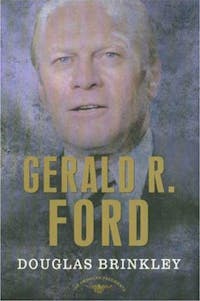Gerald R. Ford
The American Presidents Series: The 38th President, 1974-1977
 Download image
Download image
ISBN10: 0805069097
ISBN13: 9780805069099
Hardcover
224 Pages
$35.00
CA$49.00
When Gerald R. Ford entered the White House in August 1974, he inherited a presidency tarnished by the Watergate scandal, the economy was in a recession, the Vietnam War was drawing to a close, and he had taken office without having been elected. Most observers gave him little chance of success, especially after he pardoned Richard Nixon just a month into his presidency, an action that outraged many Americans, but which Ford thought was necessary to move the nation forward.
Many people today think of Ford as a man who stumbled a lot—clumsy on his feet and in politics—but historian Douglas Brinkley shows him to be a man of independent thought and conscience, who never allowed party loyalty to prevail over his sense of right and wrong. As a young congressman, he stood up to the isolationists in the Republican leadership, promoting a vigorous role for America in the world. Later, as House minority leader and as president, he challenged the right wing of his party, refusing to bend to their vision of confrontation with the Communist world. And after the fall of Saigon, Ford also overruled his advisers by allowing Vietnamese refugees to enter the United States, arguing that to do so was the humane thing to do.
Brinkley draws on exclusive interviews with Ford and on previously unpublished documents (including a remarkable correspondence between Ford and Nixon stretching over four decades), fashioning a reassessment of Gerald R. Ford's presidency and his underappreciated legacy to the nation.
Reviews
Praise for Gerald R. Ford
"Although Brinkley calls the pardon and its 'healing' effect on America Ford's most enduring legacy, he deftly describes other achievements. These include ending the divisive Vietnam War while doing his best to aid South Vietnam's refugees; helping to forge the 1975 Helsinki Accords that led the Soviet Union to acknowledge basic human rights and opened the way for its collapse, and fiscal policies that cut inflation in half and, according to Brinkley, boosted the U.S. economy out of its lowest trough since the Great Depression. This slim volume, part of The American Presidents series under the general editorship of historian Arthur M. Schlesinger Jr., is heavily footnoted but a fast read. It moves briskly from Ford's birth on July 14, 1913, in Omaha, Neb., to the memorial service at Washington's National Cathedral this New Year's Day, when former President George H.W. Bush described him as a 'Norman Rockwell painting come to life' . . . Brinkley offers insights into Ford's relationships with former presidents Carter and Reagan. Ford—nearly 90 when Brinkley interviewed him—was still smarting over Reagan having challenged him for the Republican nomination in 1976, saying it was 'a low-down stunt" that 'really burned the hell out of me.' Had Reagan earnestly campaigned for the incumbent instead of giving him a lukewarm endorsement after losing the GOP nomination, Ford said he could have beaten Carter."—Jack Nelson, Los Angeles Times
"Brinkley succinctly and accessibly details Ford's long Congressional career. As Brinkley makes clear, Ford's lifelong ambition was to become not president but speaker of the House . . . Brinkley shows how Ford built his career in Congress as a bland, nonideological, yet highly effective crafter of bipartisan coalitions."—Chuck Leddy, The Boston Globe
"A rock-hard moral core defined Gerald Ford. Unrattled by the speed of events of by their uneven consequences, Ford remained the steadiest of public men, certain of his course and confident in his ability to keep to it. He may have landed in the White House without planning to, but he proved well prepared for the nation's highest office, intellectually as well as emotionally. Having never slogged through the mud of a presidential campaign, he arrived in the White House with neither an untoward gratitude for those who had supported him nor any lingering animosity toward those who hadn't. Instead, he had an unobstructed view of his enormous and widely diverse constituency, and his record in the White House was remarkably evenhanded. He left the presidency in far better shape than he had found it—perhaps even healthier than it had been in decades."—Douglas Brinkley on Gerald R. Ford
Reviews from Goodreads
BOOK EXCERPTS
Read an Excerpt
Gerald R. Ford
Editor's Note
THE AMERICAN PRESIDENCY
The president is the central player in the American political order. That would seem to contradict the intentions of the Founding Fathers. Remembering the horrid...



